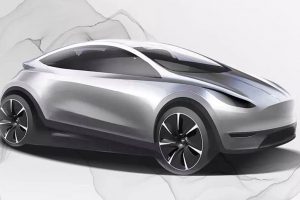Key Points
- 🚗 Tesla is urging the U.S. to implement more stringent fuel efficiency standards through 2032.
- 📈 The National Highway Traffic Safety Administration (NHTSA) proposed a 2% increase in Corporate Average Fuel Economy (CAFE) requirements for cars and 4% for trucks and SUVs annually between 2027 and 2032.
- 📣 Tesla is requesting that the White House increase efficiency standards by 6% for cars and 8% for trucks and SUVs during the same period.
- 🌍 Tesla argues that these stricter standards will help conserve energy and combat climate change.
- 🚀 Tesla is one of the few automakers producing and selling fully electric vehicles.
- 🚙 Many traditional automakers are struggling to transition their lineups to electric models.
- 🏭 General Motors, Toyota, Volkswagen, and others criticized the NHTSA’s proposal, deeming it unreasonable and in need of revisions.
- 💰 The NHTSA claims its proposal will save Americans money on gas and enhance energy independence.
- 💸 Automakers are concerned about non-compliance penalties and the cost of meeting the proposed standards.
- ⛽ Automakers also oppose the U.S. Energy Department’s plan to revise how fuel economy for electric vehicles is calculated in the CAFE program.
- ⚡ This is not the first time Tesla has pushed for more ambitious fuel economy standards from federal agencies.
Tesla has called on the Biden administration to enact stricter fuel efficiency standards through 2032 than those recently proposed by U.S. regulators.
In July, the National Highway Traffic Safety Administration (NHTSA) proposed increasing the Corporate Average Fuel Economy (CAFE) requirements for cars by 2 percent and by 4 percent for trucks and SUVs annually between 2027 and 2032. The proposal was challenged by the Alliance for Automotive Innovation, which said that the move “exceeds maximum feasibility.”
Now, Tesla has responded by requesting that the White House increase the efficiency standards annually by 6 percent for cars and 8 percent for trucks and SUVs between 2027 and 2032, according to a report from Reuters. Tesla says enacting the stricter proposal would “conserve energy and address climate change.”
The result of the NHTSA’s original proposal would establish an average fleet-wide fuel efficiency of 58 miles (93 km) per gallon by 2032. The news also comes as many traditional automakers face difficulty in switching their entire lineups to fully electric models, although Tesla only produces and sells fully electric vehicles.
On Monday, an automotive group that represents General Motors (GM), Toyota, Volkswagen and most other major automakers shared harsh criticism of the NHTSA’s proposal, saying that it wasn’t reasonable and requires several revisions.
In a separate response, the American Automotive Policy Council, which represents Ford, GM and Chrysler’s parent company Stellantis, pushed the NHTSA to cut its proposed increases in half to just 2 percent for trucks and SUVs. In the statement, the council said the NHTSA’s original proposal “would disproportionately impact the truck fleet.”
Additionally, the group pointed out that roughly 83 percent of all vehicles produced by Ford, GM and Stellantis are trucks.
The NHTSA responded by saying the proposed rule “is focused on saving Americans money at the gas pump and strengthening American energy independence.” The agency expects the proposal to have combined benefits exceeding costs by over $18 billion.
Last month, the Alliance for Automotive Innovation said automakers would be held responsible for over $14 billion in non-compliance penalties between 2027 and 2032 under the current rules.
In response to the NHTSA proposal, Toyota said on Tuesday that the fines were “proof that there is insufficient technology to meet the proposed standards and that such standards have been set beyond maximum feasible.”
In separate projections, automakers GM, Stellantis and Ford have estimated that the NHTSA’s proposal would cost them $6.5 billion, $3.1 billion and $1 billion, respectively.
The automakers have also fought against the U.S. Energy Department’s proposal to make large revisions to how petroleum-equivalent fuel economy is calculated in the CAFE program, adding that doing so could “devalue the fuel economy of electric vehicles (EVs) by 72 percent.”
This is not the first time Tesla has encouraged federal agencies to take proposed fuel economy standards even further. In June, Tesla stated that the Environmental Protection Agency’s (EPA’s) emission limits on heavy-duty trucks, proposed in April, didn’t go far enough in encouraging the U.S. to electrify larger vehicles.
The United Auto Workers (UAW) union, representing Ford, GM and Stellantis, asked President Biden in July to reconsider proposed fuel economy standards, deeming them unfeasible.





